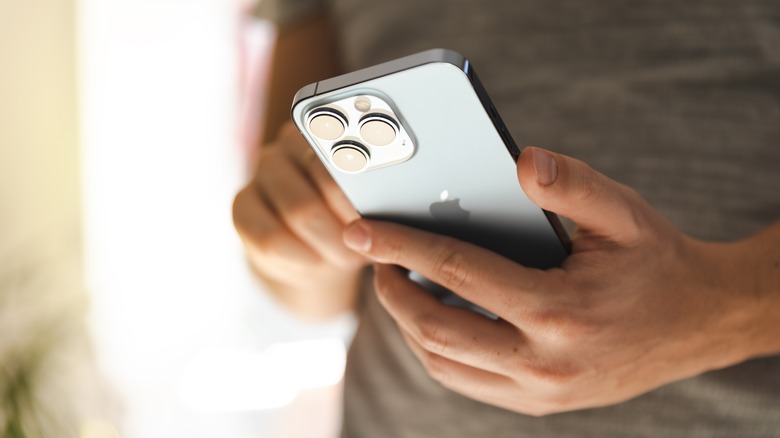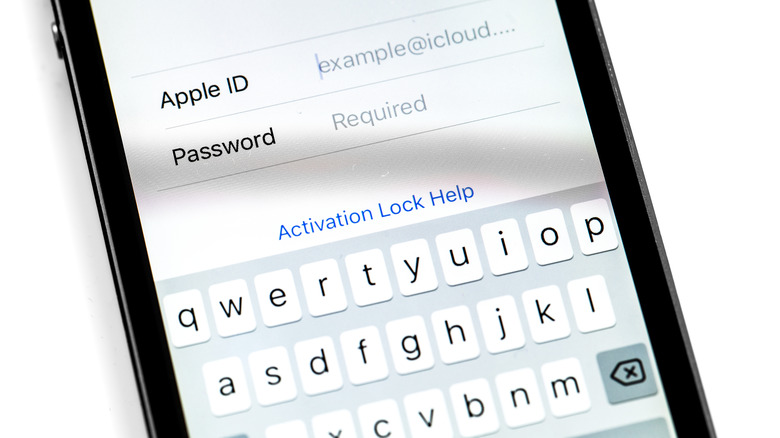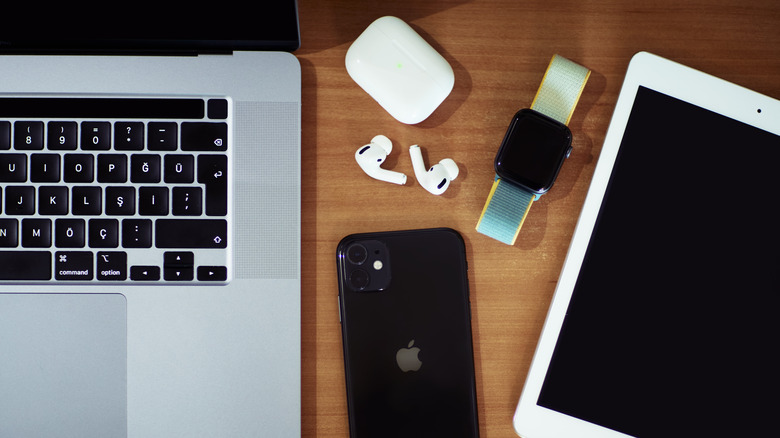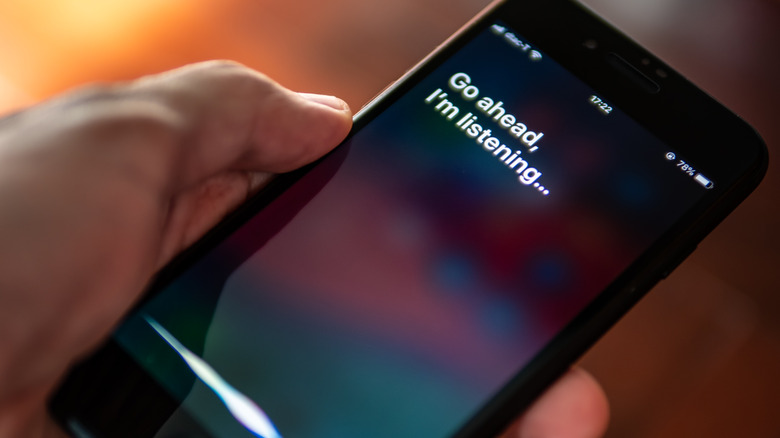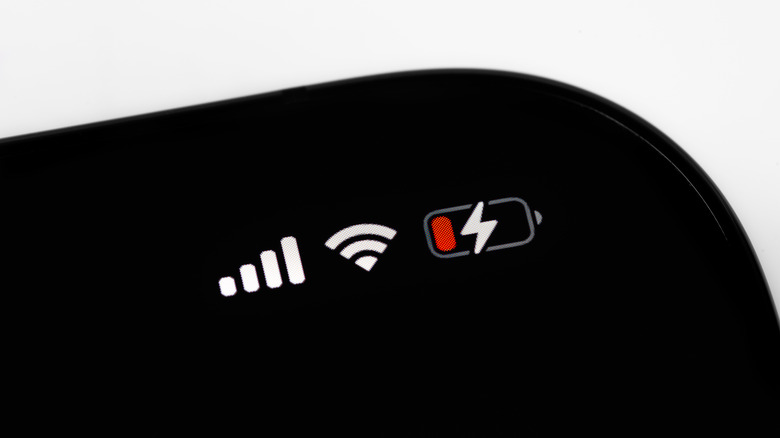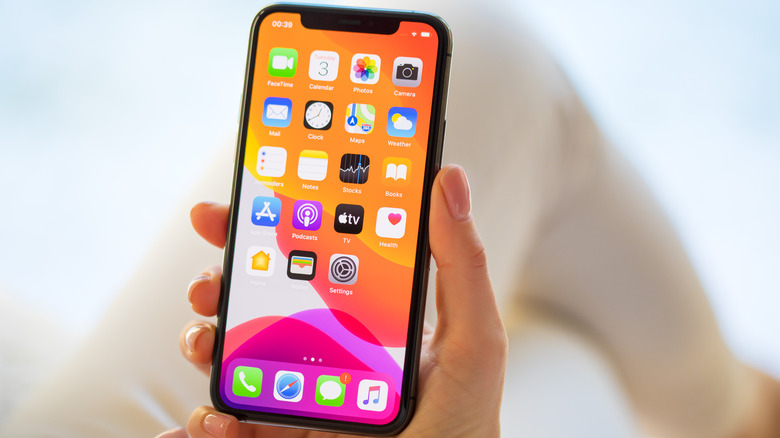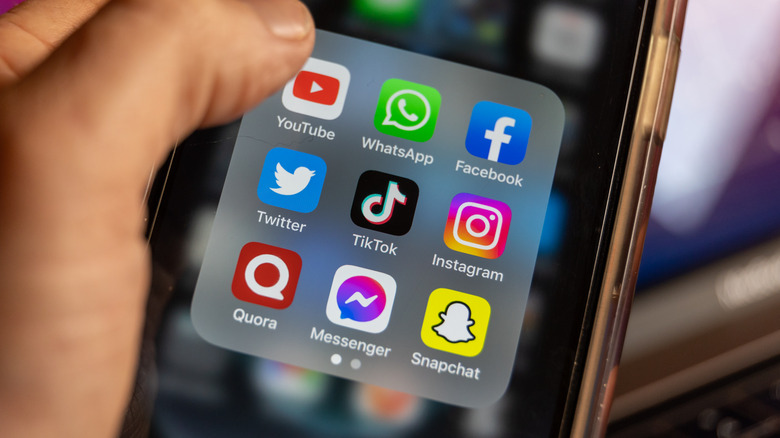How To Know If Someone Is Tracking Your iPhone: 7 Signs To Look Out For
iPhones these days are a truly wondrous thing. It is an entire world in the palm of your hand that can track your location, your buying habits, your bank details, and your passwords all in the name of simplifying life's daily tasks. And they are packed with hidden features that make life even easier. Almost everybody owns a smartphone these days, and unfortunately, this can make it easy for bad guys to potentially get into our phones and find ways to track all of these important personal details that desperately need to be kept under lock and key.
Thankfully, Apple security is very robust and for the most part, all you need is a strong password and two-factor authentication on your iPhone to keep your account and details safe. However, if the bad guys do manage to gain access to your iPhone, there are some tell-tale signs that can help you discover them before they do too much damage. Most of the items on this list can have perfectly innocent explanations and most of the time will not mean somebody is tracking your iPhone. But if they are, these things can be stopped fairly easily — and more often than not, you should have nothing to worry about.
Compromised Apple ID
If you suspect your Apple ID has been compromised, you should ask yourself these questions: Have you ever received an email from Apple claiming that your Apple ID sign-in has been recognized from a new device? Have you ever received an email claiming that your account password has recently been updated? Have you ever discovered deleted messages and files? Have you been charged for iTunes purchases that you don't recognize? Does Apple ID not recognize your current password?
If so, there could be a chance that somebody other than you has gained access to your Apple ID.
This can be quite scary, but thankfully there is an easy fix. Apple security has all the necessary precautions in place if your Apple ID is ever compromised, despite some hiccups with Apple ID verification in the past. If you are unable to access your account, you can use Apple's account recovery tool to reset your account, recover your Apple ID, and get back into your account. To stop this from ever happening again, it is a good idea to create a strong password as well as turn on two-factor authentication for your Apple ID, as this makes it virtually impossible for anybody other than you to gain access to your account.
Unknown devices in family sharing or FindMy
Family sharing and FindMy are a good way for trackers to gain access to your Apple devices. Family sharing is a very useful tool as it can be used to share subscriptions, purchases, photos, photo albums, locations, calendars, and more, all without sharing each other's Apple accounts. Most people do not check these very frequently, as they're mostly used in emergencies or to update and add new members. As a result, this tool has a lot of access granted to a user's account which can be used for nefarious means. These tools should be checked as often as possible to make sure there are no devices shown that should not be there.
If you do find a device in there that you do not recognize, there is an easy way to remove the device. Head to Settings > [your name] > Family Sharing. Click on the device you want to remove, then click "Remove from Family" to clear that device from your family sharing.
Compromised microphone/camera permissions
When making a call, background noises are usually just a sign of a bad connection. However, there is the small chance that your iPhone has some level of spy software installed in it. There are certain spy apps that can record phone calls which can result in strange noises that can be heard when making a call. If during a phone call you can hear a beeping noise, static, clicking, or even other voices, it may be possible your iPhone is being tracked.
If your camera app is opening without you specifically requesting it, this could signify that spyware apps are tracking and collecting images that are being sent to other devices. However, there are ways your can notice this spyware and cut them off at the pass. Spyware apps will ask for permissions that are clearly out of the ordinary. When a notes app is asking for camera permission, or a maps app is requesting microphone access, then you might want to investigate.
Strange power consumption
Spy software will often run in the background of your iPhone without your knowledge. If you discover that your iPhone is burning through its battery at an irregular rate, it could be a sign that there is some level of spyware downloaded onto your iPhone. Now, iPhone batteries can be persnickety at the best of times, so spyware should not be your first thought if your battery is running lower than it should. There are countless reasons why your battery is draining faster than you imagined — apps are often left open without your knowledge, and the batteries in older iPhones will often shrink as the device gets older, among countless other reasons. What you should be looking out for is irregular power consumption.
Checking the physical heat of your iPhone is also a good idea. If your iPhone is running hot, it could be a sign of some spyware being installed on your device. Spy apps run in the background and use a lot of data, causing your iPhone to physically overheat and drain the battery. iPhones can also overheat through purely innocent means as well — like if the ambient temperature is hot — however, if you feel your iPhone suddenly rising in temperature even when it is in idle mode, it may be possible that there is some spyware working in the background.
Random shutdowns/reboots
Spy apps will take up a lot of power but thankfully, these apps cannot go unnoticed for very long. A spy app will affect an iPhone in one way or another. If your iPhone screen becomes unresponsive, apps become slower, settings start changing automatically, or your iPhone randomly shuts down or reboots, this may be a sign that your device is being tracked remotely.
Your iPhone should not randomly shut down or reboot. This should always happen with your direct involvement. If you find your iPhone does do this at any point, it could be that your iPhone has some spyware installed. Low-quality spy software can cause your iPhone to malfunction, causing unwanted shutdowns or reboots. To completely remove any spyware on your iPhone, one option is to perform a factory reset. This should be considered a last resort as it will delete everything on your iPhone (though it is easy enough to back everything up). To do a factory reset, go to Settings > General > Transfer or Reset iPhone, and then tap "Erase all Contents and Settings." This will clear any kind of spyware in the reset.
Receiving strange messages
Everyone receives odd text messages here and there. Most of the time they mean absolutely nothing. Usually, it is just a scammer who has entered a random string of numbers and ended up with your phone number. They are scams hoping to get a person to enter their personal information, like bank details or passwords. These random messages are generally harmless so long as you ignore them and they are not too frequent.
Although, if you are receiving a lot of messages that contain some kind of code, it is a general indication that there is a spyware tool on your iPhone. Trackers send these codes as a way to check the status of the spy app. There is no way to stop receiving scam calls or messages, but using caution and ignoring/deleting them is usually the best course of action. It is also a very good idea to never click on a link from a sender you do not recognize.
Suspicious apps and/or browser history
Keeping an eye on the apps that are downloaded to your iPhone as well as its browser history is a quick and easy way of checking your iPhone's security. If you happen to notice an app you don't remember downloading or strange webpages open in your browser that you did not visit, it may be possible your iPhone has been compromised.
If you discover an app you don't recognize, there is a chance that this app is being used to monitor your activities. If this is the case, it would be best to delete the app and make sure to check which apps have permission to access your data. If you are using the Safari browser, you can clear all history and website data by going to Settings > Safari > Clear History and Website Data. Changing your account password for good measure is always a good idea as well, making sure to log out of all known devices while you are at it.
